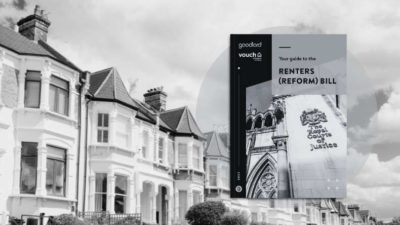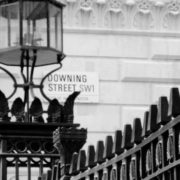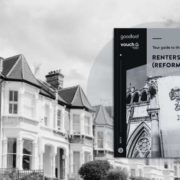We end the year as we began it, gripped by Covid uncertainty.
Like an unwelcome guest, the coronavirus keeps turning up at the most inconvenient moments, each time a little different from on the previous visit.
We have been here before, and the sense of déjà vu is palpable, as it is in the housing market.
What will Omicron mean for housing?
I am a great fan of the comment attributed to Nye Bevan, a giant of the Labour Party of the past.
He said: “Why read the crystal when he can read the book?”
In other words, you do not have to gaze into a crystal ball to see what the future holds when you have the history to hand.
As I write this, we are in the middle of a massive rollout of vaccine booster doses.
Further restrictions have been mooted, beyond Plan B, but the government is apparently set against any further lockdowns.
Working from home guidance is back, and it appears that it is being observed.
In some respects, however, even in the absence of a lockdown, changes in people’s behaviour as bookings and events are cancelled, can replicate its effects.
So, we can look to past lockdowns for the history.
It is a long time ago now, but most people reading this will remember the first lockdown, in March 2020, when the housing market was closed for two months, and the official statisticians suspended collection of data for their house price index.
Monthly residential property transactions slumped by 55% between March and April 2020, to a level of roughly 40% of their end-2019 average, before recovering slightly in May, when the market re-opened.
There was a similar profile for mortgage approvals.
Now fast forward to November last year, the month of the second lockdown.
This time the housing market stayed open, even if staying open meant operating virtually for many.
Most adapted well to the new environment, in a way few would have expected earlier in the year.
Virtual viewings became the norm and many in the industry were comfortable with the new working from home norm.
So were many buyers, no longer looking for somewhere convenient for the daily commute into work but, perhaps, a new working lifestyle in which they are rarely, if ever, in the office.
Taking transactions again as our guide, they rose by 7.5% to 115,270 between October 2020 (no lockdown) and November (lockdown).
The November figure was not far short of three times the March low. The market sailed through the second lockdown.
There was a small setback in January this year, when the third lockdown began, and transactions dipped by 4%.
But that was followed by a remarkable 53% rise over the following two months, in the run-up to the original March 31 deadline for the end of the chancellor’s stamp duty reduction.
Rishi Sunak extended that deadline to the end of September in his March Budget, but the momentum was already established, and many transactions had passed the point of no return.
The history tells us, then, that the housing market adjusted well to the lockdowns that followed the first in March 2020.
It was a story of remarkable adaption and, indeed, of a remarkably strong market in the light of the uncertainties the country was going though.
That strength has persisted, at least for prices since the stamp duty cut expired on September 30.
The Halifax reported that prices in the September-November period rose at their fastest rate since 2006, before the financial crisis.
House price inflation on the official measure remained in double figures (10.2%) in October.
Every survey shows that supply shortages (of existing homes) are running up against strong demand and driving up prices.
That is more like the “normal” market that we had before anybody had heard of Covid-19.
Everybody was looking forward to the speedy return of complete normality until the Omicron variant emerged.
The housing market is pretty well placed to deal with a delayed return to normality.
History will not exactly repeat itself, however.
The stamp duty cut will not make a comeback and the Treasury will seek to resist the return of other forms of Covid support.
The chancellor believes that he has seen the back of the furlough scheme.
Instead of tax cuts, there are tax increases to look forward to in April, as well as higher energy bills.
The jump in inflation to 5.1% in November, in figures just released, means that it is a question of when not if interest rates go up.
So, things might be a bit bumpy for a while, at least until there is reassurance about the new variant.
The market has been resilient. It may need some of that resilience in the coming weeks.

























Interesting and informative article as ever. The biggest challenge we have had – and speaking to many other industry contacts it seems we are not alone – is the extended conveyancing time taken in residential transactions, especially since the advent of Covid.
After almost 40 years in the industry I am still perplexed and frustrated at the incompetence and arrogance of many in the legal profession. Chains, of course, proceed only as fast as the weakest link. Conveyancing should be a great deal quicker these days with the advent of email and internet technology, but in reality many sales are taking some 5 or 6 months to go through to completion. Then lawyers these days often opt for simultaneous exchange and completion as it suits them to do so, this was never standard practice some time ago as lawyers understood than buyers and sellers needed time between exchange and completion to arrange furniture vans etc.
Probably safe to post this now as many lawyers will close their doors at midday today and return some time half way through January!!
Merry Christmas all!!
Two problems running alongside conveyancing are the land registry and the courts.
I’ve waited 6 months for a title to be registered and the land registry cannot yet give a date when this will be completed. Registration is mainly a paper and increasingly digital process so why has it been so drastically affected. This will of course have an effect on conveyancing times.
The average time for evictions has now risen to 68 weeks!!! This is the court time, not the whole process.
Prehearing reviews have been a farce, the judge has spent virtually as much time “reviewing” the evidence package as he would have spent at the actual hearing. The reviews were supposed to speed up the handling of the backlog by giving one of three rulings. Granted, thrown out, or requiring a court hearing. Less than 1% have NOT gone on to a court hearing.
Property Courts are now supposed to be going to online hearings to speed things up. As this will basically be the prehearing review initiative, renamed, I don’t hold out much hope of any improvements anytime soon.
Why are the property courts so bogged down when they don’t come into contact with the public anymore? If this had been the private sector, then I am sure it would have been sorted out months ago. After all, you can sit on a plane crowded with drunken holidaymakers for a few hours but can’t sit in front of a sober Judge on a computer screen for a few minutes.
A cynic would suggest that the pandemic was a good excuse for the courts to take a few months’ holiday, knowing that their jobs were safe.
Conveyancing searches have also dramatically slowed down as councils drastically destaffed anticipating a housing sale collapse.
I would not normally defend solicitors but in this, I think they can claim mitigating circumstances.
While the property market is so buoyant it can cope with the fog of this chaos, but, if it gets fragile, look out for the car crash.
Merry Xmas all, but I can’t see this mess being sorted out in the New Year.